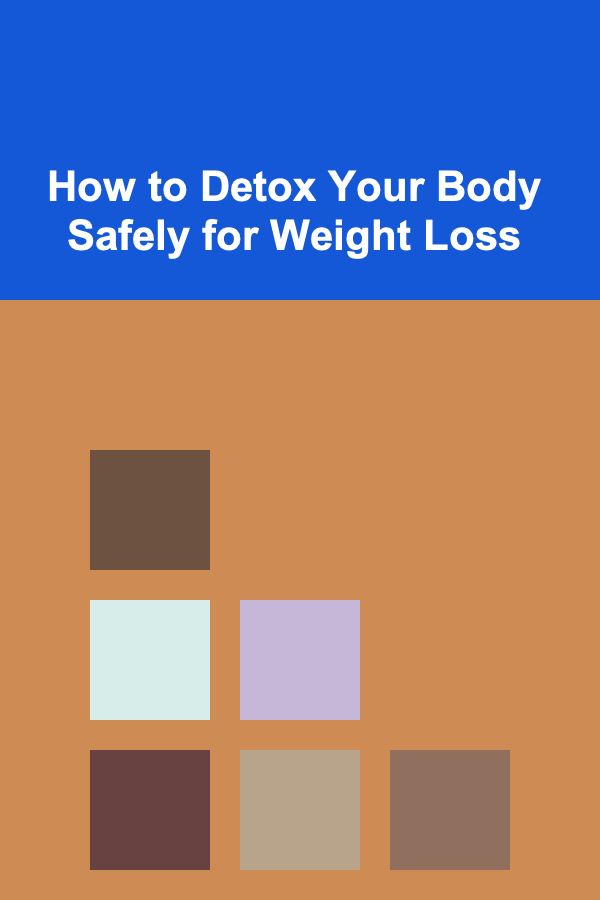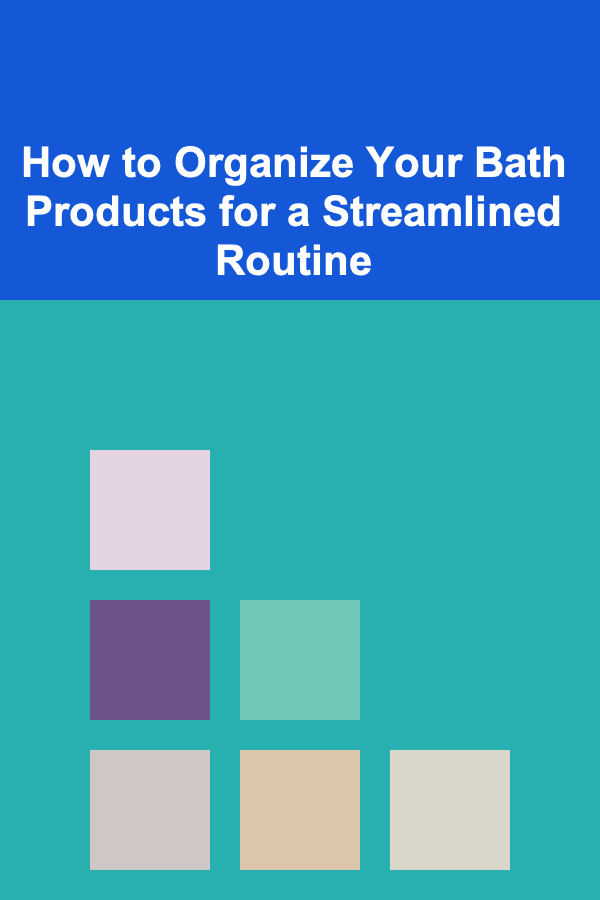
How to Clean Your Home Without Using Disposable Products
ebook include PDF & Audio bundle (Micro Guide)
$12.99$5.99
Limited Time Offer! Order within the next:

In today's world, where sustainability is at the forefront of environmental conversations, many people are looking for ways to minimize waste in all aspects of life, including cleaning. Disposable cleaning products, such as paper towels, wipes, and single-use mop pads, contribute significantly to the growing piles of waste in landfills and oceans. As the demand for eco-friendly alternatives increases, many people are turning to reusable and sustainable options to clean their homes without using disposable products. This article explores how to clean your home effectively and efficiently using non-disposable products, offering practical advice on cleaning techniques, products, and habits that will help reduce your environmental footprint.
Understanding the Problem with Disposable Products
Before diving into the ways to clean without disposables, it's essential to understand why this shift is necessary. Disposable cleaning products, although convenient, have several downsides:
- Waste Generation: Items such as paper towels, cleaning wipes, and disposable mop pads are typically used once and thrown away. This practice contributes significantly to landfill waste.
- Resource Consumption: Disposable products are made from raw materials that require energy and resources to produce. In addition to contributing to waste, this process consumes water, energy, and trees.
- Chemical Pollution: Many disposable cleaning products are pre-soaked with chemicals that can leach into the environment when discarded, contaminating water supplies and harming ecosystems.
By transitioning to reusable, sustainable cleaning tools and products, you can reduce waste, save money over time, and contribute positively to the environment.
Essential Reusable Cleaning Tools
Switching from disposable products to reusable alternatives involves using tools that can be washed and reused over time. Here are the key reusable tools you'll need for an eco-friendly cleaning routine:
1. Cloth Rags and Towels
Instead of using paper towels for wiping down surfaces, opt for reusable cloth rags or towels. Old t-shirts, sheets, and towels make excellent materials for homemade cleaning cloths, as they are soft, absorbent, and durable.
- Benefits: Cloth rags can be washed and reused hundreds of times, significantly reducing the need for single-use products.
- Use Cases: Use rags for dusting, wiping down counters, cleaning windows, and absorbing spills.
2. Microfiber Cloths
Microfiber cloths are made from synthetic fibers that are designed to trap dirt, dust, and bacteria, making them highly effective for cleaning. They are washable and can last for years, reducing the need for disposable wipes and other similar products.
- Benefits: Microfiber cloths are great for cleaning without chemicals and can pick up more dirt than traditional cotton cloths.
- Use Cases: Use microfiber cloths for dusting, polishing, and cleaning windows and mirrors. They can also be used for light cleaning tasks in kitchens and bathrooms.
3. Reusable Mop Pads
Instead of using disposable mop pads, opt for reusable microfiber mop pads. These pads can be attached to any standard mop and are washable, making them an excellent alternative to single-use products.
- Benefits: Reusable mop pads can be washed and reused many times, reducing waste.
- Use Cases: Use them to mop floors, whether you have hardwood, tile, or vinyl floors. They can be used for both wet and dry mopping.
4. Broom and Dustpan
Although brooms and dustpans are often seen as traditional tools, they remain one of the most effective ways to sweep up dirt without generating any waste. Many people opt for disposable dusters or sweepers, but these are not necessary when you use a good-quality broom and dustpan.
- Benefits: Brooms and dustpans are long-lasting and do not require replacement after every use.
- Use Cases: Use the broom for sweeping dirt, dust, and crumbs from floors, and use the dustpan to collect them without creating waste.
5. Reusable Spray Bottles
Instead of buying single-use cleaning sprays, consider investing in reusable spray bottles. You can fill these with homemade or store-bought cleaning solutions, significantly cutting down on plastic waste.
- Benefits: Refillable bottles can be used over and over again, reducing the need for purchasing new plastic bottles of cleaning products.
- Use Cases: Fill with homemade cleaners made from vinegar, baking soda, or natural store-bought solutions.
6. Natural Sponges and Scrub Brushes
Natural sponges, made from cellulose or sea sponge, and scrub brushes with wooden handles can replace disposable synthetic sponges and scrub pads.
- Benefits: Natural sponges and brushes are biodegradable and reusable. They do not contribute to plastic pollution.
- Use Cases: Use these tools for scrubbing dishes, counters, sinks, and other surfaces.
Making Homemade Cleaning Products
Switching to reusable tools is an important step, but the next part of reducing waste and chemicals is making your own cleaning products. Many commercial cleaning products come in single-use plastic containers and contain harsh chemicals that can be harmful to the environment and your health. Making your own cleaning products allows you to control the ingredients and packaging. Here are some easy and effective homemade cleaning solutions:
1. All-Purpose Cleaner
An all-purpose cleaner can be used for nearly every surface in your home, from countertops to floors. Here's a simple recipe:
-
Ingredients:
- 1 cup white vinegar
- 1 cup water
- 10-20 drops of essential oil (optional for scent)
-
Instructions: Mix the vinegar and water in a spray bottle. Add essential oils if desired, and shake well before use. This cleaner works for most surfaces and helps to disinfect and deodorize.
2. Glass Cleaner
For streak-free windows and mirrors, you can make a highly effective glass cleaner with just two ingredients:
-
Ingredients:
- 1 cup water
- 1 cup white vinegar
-
Instructions: Mix the ingredients in a spray bottle and use it to clean glass surfaces. It's safe, effective, and free from harsh chemicals.
3. Floor Cleaner
A simple floor cleaner for hardwood, tile, or laminate floors can be made using natural ingredients:
-
Ingredients:
- 1 gallon of warm water
- 1 cup white vinegar
- A few drops of essential oil (optional)
-
Instructions: Mix the ingredients in a mop bucket. Mop floors as usual, and allow them to air dry. This solution is effective at cleaning floors without leaving harsh chemicals behind.
4. Bathroom Cleaner
Bathrooms are some of the hardest areas to clean, but a simple, natural cleaner can do wonders:
-
Ingredients:
- 1 cup baking soda
- 1/4 cup liquid castile soap
- 1/4 cup white vinegar
-
Instructions: Combine the ingredients in a bowl to form a paste. Use a sponge or cloth to apply it to sinks, tubs, and toilets. Let it sit for a few minutes, then scrub and rinse.
5. Dish Soap
A natural dish soap can be made with just a few ingredients that are gentle on both your hands and the environment:
-
Ingredients:
- 1/2 cup liquid castile soap
- 1/2 cup water
- 1 tablespoon vinegar
- 1 tablespoon baking soda
- A few drops of essential oil (optional)
-
Instructions: Mix all the ingredients in a bottle and shake well. Use this soap for washing dishes as you normally would.
Sustainable Cleaning Practices
In addition to using reusable tools and homemade cleaning products, there are several sustainable cleaning practices you can adopt to further minimize your environmental impact:
1. Conserve Water
When cleaning, be mindful of your water usage. Turn off taps when they're not in use, and consider using a basin to soak items instead of running water continuously. Using a microfiber mop with minimal water can also reduce your water usage.
2. Use Natural Light
When cleaning, try to make the most of natural light. Open your curtains or blinds during the day to allow sunlight into your home. This not only conserves energy but also reduces the need for artificial lighting, which often requires electricity generated from non-renewable sources.
3. Recycling and Composting
When cleaning out clutter or cleaning out expired products, ensure that you recycle or compost properly. Avoid sending recyclables and compostables to the landfill, where they will not decompose and may contribute to pollution.
4. Reduce Chemical Use
Many commercial cleaning products contain harmful chemicals that can be released into the environment. By switching to natural, homemade cleaners, you help prevent toxic chemicals from contaminating the air, water, and soil. Avoid cleaners that contain synthetic fragrances, artificial dyes, and other harmful additives.
Conclusion
Cleaning your home without using disposable products is a meaningful step towards a more sustainable lifestyle. By adopting reusable cleaning tools, making your own cleaning products, and practicing eco-friendly cleaning habits, you can reduce waste, save money, and protect the planet. While it may require some initial effort to transition away from disposable products, the long-term benefits for both your home and the environment make it well worth the investment. Start small, and gradually incorporate these practices into your cleaning routine---your home and the planet will thank you.

How to Detox Your Body Safely for Weight Loss
Read More
How to Organize Your Bath Products for a Streamlined Routine
Read More
How to Organize Your Home to Make It Pet-Friendly
Read More
How to Protect Your Home from Natural Hazards with Smart Sensors
Read More
Ways to Make Money by Teaching Deep Learning Online
Read More
Why Clear Surfaces Lead to a More Peaceful Home
Read MoreOther Products

How to Detox Your Body Safely for Weight Loss
Read More
How to Organize Your Bath Products for a Streamlined Routine
Read More
How to Organize Your Home to Make It Pet-Friendly
Read More
How to Protect Your Home from Natural Hazards with Smart Sensors
Read More
Ways to Make Money by Teaching Deep Learning Online
Read More